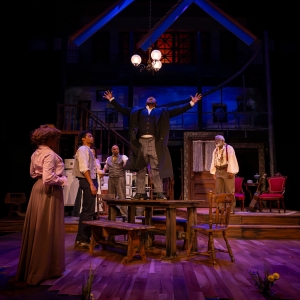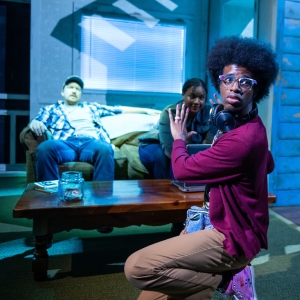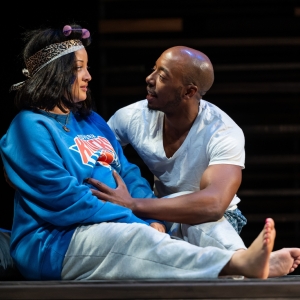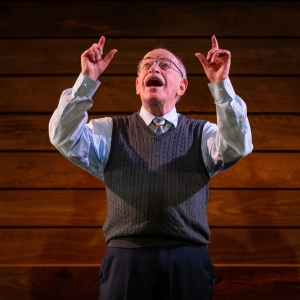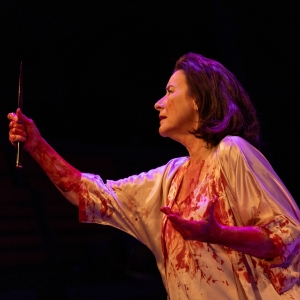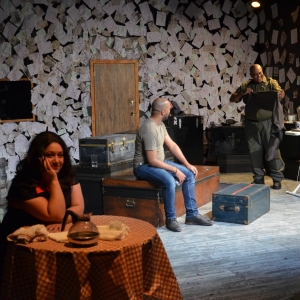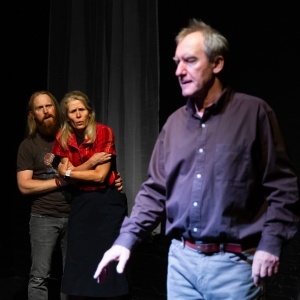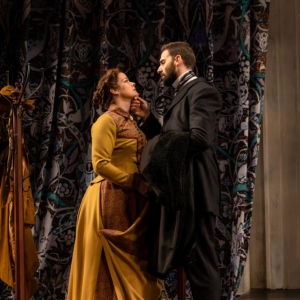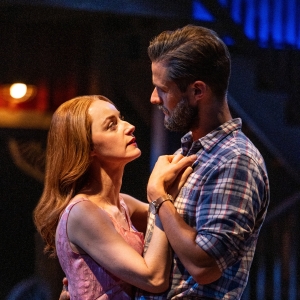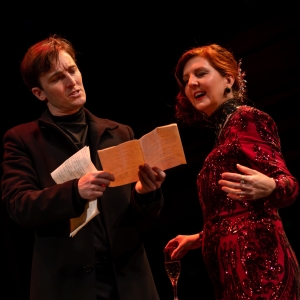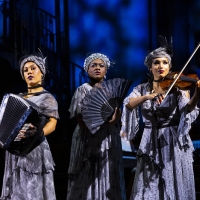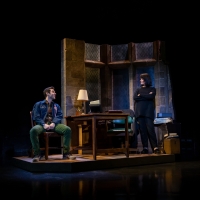Review: A Realistic and Involving STEREOPHONIC at National TheatreFebruary 11, 2026History will record that in 1976, a rock group named Fleetwood Mac, three men and two women, three Brits and two Americans, congregated with an engineer and staff at a recording studio in Sausalito, north of San Francisco, to begin recording a new album.
Review: Jane Austen's PERSUASION at Chesapeake ShakespeareOctober 6, 2025There is a great deal to like about the dramatization of Jane Austen’s novel Persuasion, just opened at the Chesapeake Shakespeare Company. There’s Kristina Lambdin’s stunning military dress uniforms and high-waisted Regency dresses.
Review: Not in Kansas Anymore: Tornado Tastes Like Aluminum Sting at CATFJuly 18, 2024In presenting the story of a neuro-diverse protagonist mostly through the protagonist's eyes, and shredding narrative consistency and sequence, the playwright Harmon dot aut has rendered a confusing story. But with captivating characters and subject matter, this is still a play worth seeing.
Review: A Creepy ENOUGH TO LET THE LIGHT IN At Contemporary American Theater FestivalJuly 15, 2024As a vehicle for making things go bump in the night, I’m not sure this show consistently hits the target. It is a bit too much of a human interest story for that, but a bit too bump-filled to work smoothly as a human interest story either. Yet there are some legitimate skin-crawling moments, and the story reaches as reasonable a conclusion as it can, taking into account the subject-matter and the indeterminacy of the ending I mentioned. Theatergoers may walk out arguing about that ending, which is probably a good thing. But it will in any event have been an entertaining ride reaching that point.
Review: A Stunning WHAT WILL HAPPEN TO ALL THAT BEAUTY? at Contemporary American Theater FestivalJuly 10, 2024This is an important play, to be considered a peer of Angels in America and The Inheritance, a sweeping two-play multigeneration account of the impact of AIDS on the American gay community -- with the difference that this one focuses on men and women of color. It may suffer from some lack of restraint and melodrama, but it makes up for it with the depth and breadth of its consideration, the power of the acting, and the force of its polemic concerning the beauty of the gay community and its members, the care shown by its caretakers, and the importance of creating records. You could feel the love in the play, and fall in love with the characters.
Review: A Wry Storyteller Narrates Horror and Recovery: THE HAPPIEST MAN ON EARTH at CATFJuly 10, 2024It's not an unfamiliar tale, following Holocaust victim Eddie Jaku from comfortable circumstances through horror and gradually out again. Because there has been a sizeable body of Holocaust literature, drama and cinema, little of this is exactly new to us. But Jaku’s personality, his wry way of describing these grim situations, makes us eager to hear them recounted. And Kenneth Tigar's portrayal of Jaku is key; Tigar seems to disappear into his character. We are not conscious of acting, just of Eddie. You should meet him.
No Mystery: Go See CLUE at HippodromeMay 8, 2024So, even with one major problem, the muddy sound denign, whether to go see this show is no mystery. The solution: catch it while it’s here.
Review: The Atreides Are Us in THE ORESTEIA at Chesapeake Shakespeare CompanyFebruary 19, 2024There are great depths here, and great wisdom, and Playwright Ellen McLoughlin’s handiwork and that of Chesapeake Shakespeare convey them well. It is good to see a Shakespeare-oriented theater applying its tools and insights to other material from time to time, particularly classical material that is not often produced in these parts.
Review: In THE BOOK OF GRACE from Rapid Lemon, a Penchant for Grand Themes and Intoxicating Characters, Outstanding CastJanuary 15, 2024Playwright Suzan Lori-Parks evidently likes to swing for the fences. In The Book of Grace, now being presented by Rapid Lemon, he is fearless in presenting an extravagantly exaggerated and often violent version of the realities she sees in our country today. Despair seems the only reasonable response – and yet optimism, however irrational, cannot be absolutely extinguished. Parks exhibits an extravagant talent and a penchant for grand themes – and a pervasive if not totally dominant skepticism.
Reality Crumbles But A Plot Emerges: Jon Fosse's STRONG WIND Premieres at Scena TheatreNovember 6, 2023Scena Theatre productions are never mere theatrical comfort food; they generally have classical or European roots and, whether comic or tragic, they are always intellectually serious affairs, out to show us or make us think about interesting matters. And this show is no exception. With not only [Nobel Laureate Jon] Fosse’s fine script and well-thought-through performances and direction (by company founder Robert McNamara, who usually directs Scena productions), not to mention, in this case, striking sound design by Denise Rose, the show packs a wallop.
Review: A Theatrical Feast: THE BRIDGES OF MADISON COUNTY at Signature TheatreAugust 19, 2023Given the moat of terrible traffic that separates Baltimore theatergoers from Arlington, what can justify a visit there? Well, one answer for sure is Signature Theatre’s stunning production of the 2014 musical The Bridges of Madison County. With a timeless story, a lush, varied score, and riveting performances, Bridges absolutely repays the drive.
Tightened and Thrilling HAMLET at Chesapeake Shakespeare CompanyMay 3, 2023I think the minimalism and starkness is intended to be clarifying; we are meant to be focused on the hearts of the various intertwined stories Shakespeare presents, and perhaps less distracted by other things going on at the very large periphery the playwright has laid out. Whatever the purpose, we find ourselves deeply drawn in, so that by the time all the bodies bestrew the stage at the end, the horror and the catharsis of it all has not only engulfed us – but thrilled us as well.
Review: A Compleat HADESTOWN at Hippodrome TheatreApril 13, 2023So, by virtue of all of these elements this show is compleat in the senses fostered by the archaic spelling of the word, what Webster's renders as 'having all the necessary or desired elements or skills.' The characters, the music, the dancing, the lyrics, and the overall message are all new and different, even if deployed in the service of 'an old tale from way back when,' and they come accompanied by a message of inspiration in the midst of tragedy. A must-see.







